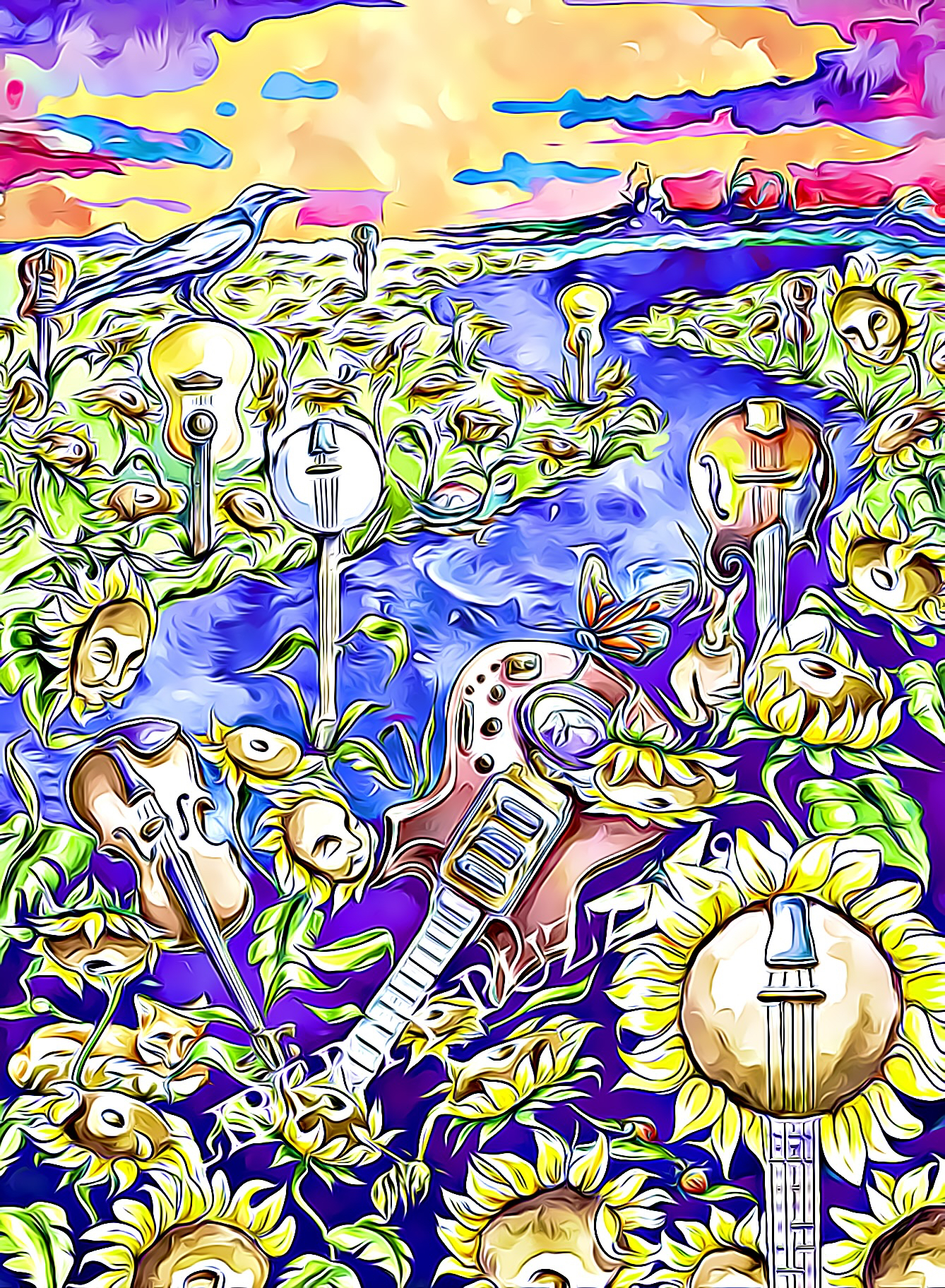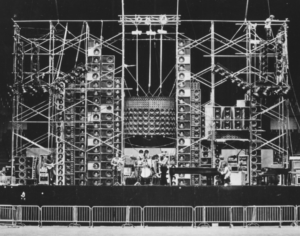
Concert of the week in Grateful Dead history: March 23, 1974 (Listen Now)
Comic book colors on a violin river crying Leonardo words from out a silk trombone.
By The Deadhead Cyclist
For Week
13
If there was a Jeopardy category entitled, “Strange band names of the Sixties,” Grateful Dead would likely be the “Daily Double.” And there are plenty of other band names that came out of that same period that appear to defy logic, regardless of how hard you try to interpret them.
For example, frequent Grateful Dead lineup partner Jefferson Airplane adopted their name from some vague blend of a friend’s dog and blues pioneer Blind Lemon Jefferson. Pretty random, and positively nonsensical. English rockers, Led Zeppelin, reportedly chose their name after a conversation about forming a band, during which one of the musicians commented that such a group would “go over like a lead balloon,” which somehow morphed into “lead (cum led) zeppelin.” A traceable chain of events, but still well outside the bounds of reason.
Similar anecdotes surround bands such as Jethro Tull, Iron Butterfly, Pink Floyd, Moby Grape, and Buffalo Springfield. But among all of the strange, nonsensical band names that came out of the Sixties, there’s one that serves better than any as a metaphor for the often absurd nature of life: The Strawberry Alarm Clock. Really? What’s that all about? Perhaps the memorable lyric from the band’s only hit tune, Incense and Peppermints, supplies a clue: “A yardstick for lunatics, one point of view.”
Still, all of these bands succeeded in becoming household names – what we refer to today as “brands” – staking their claim in then-popular music history. This illustrates the at-times mystifying truth that sometimes in life, things that appear to make no sense work in spite of their “lunacy,” or perhaps because of it. We try our best to make decisions governed by logic, but there are also times when we feel compelled to do something crazy, despite how it may seem to others, or even ourselves.
Case in point: My feelings about Santa Cruz could easily be described as love at first sight, and my affection for my new home as a refugee from Southern California only grew during my 18 years living at the Northern tip of the Monterey Bay. I had truly found myself in the redwood forests on the UCSC campus, where I studied sociology, learned to play guitar, and became a Deadhead. After graduating, I cut my teeth as a journalism entrepreneur and publisher, built a successful business, bought a house on three acres of wilderness property just ten minutes from a pristine clothing optional beach, and was living the dream when I learned that there was no alternative weekly magazine in Boulder, Colorado.
My friends and family reacted with polite incredulity when I announced that I’d decided to give all of that up, risk everything I had, and head off to Boulder with a hope and a dream. I will never forget the conflicting feelings that swirled around me as I drove through Utah with my two dogs in the back of the car. I was both scared shitless and brimming with resolve, alternating between, “What have I done?” and “There’s no weekly in Boulder.” Among all of the decisions I’d made in my life, this was by far the least rational, yet most overwhelmingly compelling.
The next several years brought me to my knees, emotionally and financially. I knew virtually nobody in Boulder, had no business contacts to rely on during the startup phase of an ambitious project, and quickly ran out of funds. In thinking back on that dark period of my life, I sometimes wonder how I was able to survive it. But, as I like to say, failure was not an option. And so, gradually, step by step, the Boulder Weekly became a successful, beloved institution that won the hearts – and advertising budgets – of a truly unique community. Today, nearly 30 years later, the business is still going strong, and I couldn’t be more grateful for throwing caution to the wind and following my instincts when I made the most irrational decision of my life.
No matter what conclusions you come to, there is one that is inescapable: With unpredictable regularity, there is a nonsense to life that defies logical explanation or rational interpretation.
Also filed under “I” for Irrational but Compelling is something the Grateful Dead did on this week in 1974: On March 23, the band pulled the curtain off their new “Wall of Sound” PA system at the Cow Palace in San Francisco, forever changing the complexion of live music. The Wall of Sound was the creation of the band’s audio engineer, Owsley “Bear” Stanley. It delivered a distortion-free product that could reach a distance of half a mile, while serving as its own monitoring system (meaning that the band could hear themselves from the same speakers that the audience was listening to, thereby eliminating the need for a separately mixed set of traditional stage monitors facing backwards towards the musicians).
This completely impractical project lasted only seven months, bankrupted the band – due to the enormous costs of transportation and crew – and caused the band to “retire” for 20 months!

Notwithstanding the debacle of the Wall of Sound, it has always stood as a symbol of the Grateful Dead’s singular commitment to the quality of their music. Despite almost bringing the band to a premature end, this nonsensical chapter in Grateful Dead history was absolutely integral to its overwhelming success.
T.W.I.G.D.H. features the 3/23/74 show, but not because it marked the beginning of the short lived “Wall of Sound Era.” This show is right up there in the Top 10 in the band’s history, and was recognized accordingly by the band’s archivist, Dick Latvala, when he selected it for Dick’s Picks Volume 24, released in February, 2002.
A highlight of this show comes during the first set in the form of one of the most stunning examples of nonsensical songwriting in the entire Grateful Dead repertoire, China Cat Sunflower. From beginning to end, the lyrics of this tune make as little sense as my decision to leave a comfortable and secure life in the redwood forests of Santa Cruz to start a weekly magazine, or the prospect of building the most complex sound system known to humanity, the financial and logistical consequences be damned! Among the stunning pattern of irrationality in the poetry of China Cat, this passage may be the most dazzling example:
Comic book colors on a violin river,
Crying Leonardo words from out a silk trombone.
I have decoded dozens of lyrics from Grateful Dead tunes, as well as plenty from other artists, but my interpretation of this particular passage is simple: utter nonsense. And yet, despite the apparent lack of logic displayed by Robert Hunter in this piece of songwriting, or perhaps because of it, China Cat Sunflower is one of the most beloved tunes among Deadheads.
Part of the challenge of the human experience is to make sense of it. Questions like, “Why am I here?” “What happens to us after we die?” “Is there a god?” “Why do bad things happen to good people?” “Is there life elsewhere in the Universe?” and “Do we have free will?” have puzzled even the most brilliant philosophers for as long as we big-brained apes have roamed the Earth. While unlikely to break the Top 10 or even the Top 100, we can certainly add, “What is a ‘violin river’ or a ‘silk trombone’?” And, “What sorrow might lead one to cry ‘Leonardo words’?”
Most of us seek the answers to life’s big questions as a means of constructing a roadmap to happiness and fulfillment. It’s a worthy effort, as it leads to a framework of principles to live by. But no matter what conclusions we reach, this one’s inescapable: With unpredictable regularity, there will be nonsense in life that defies explanation or rational interpretation. Accepting this as Life Principle #1 is as reliable a key to unlocking the door to happiness and fulfillment as anything that can be derived from reason and logic.
You never know when following an irrational but strangely compelling path might lead you to create the greatest sound system in the world, a brilliant song heard by millions the world over, or perhaps the fulfillment of your truest destiny.
Concert of the week in Grateful Dead history: March 23, 1974 (Listen Now)
Want to find out about future concerts of the week?